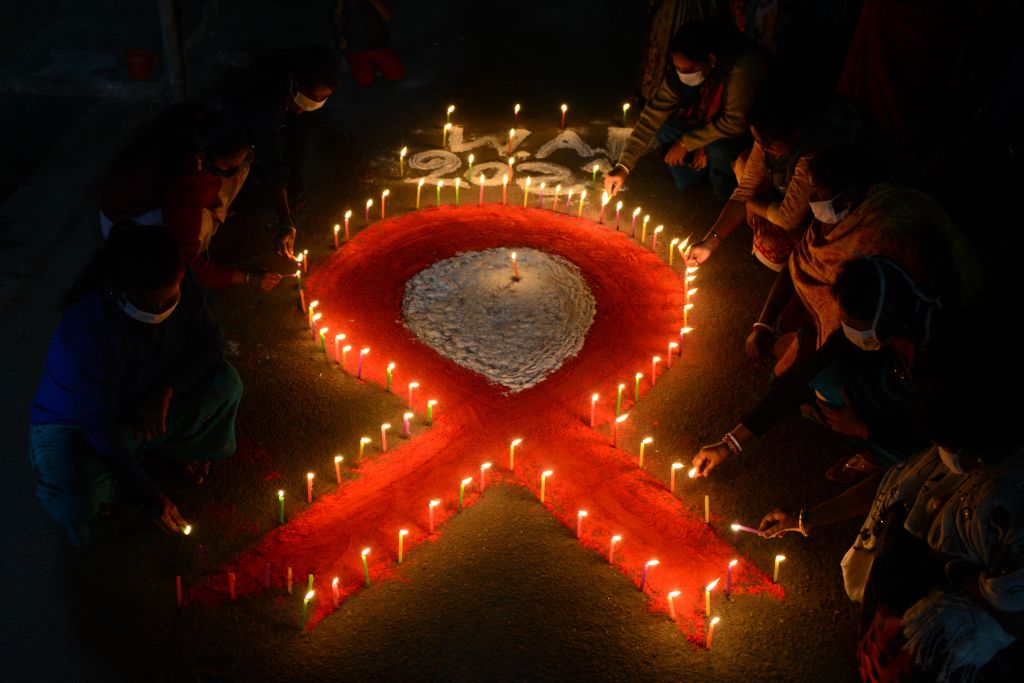World AIDS Day Reminds Us To Press Forward in the Fight to End the HIV/AIDS Epidemic
Source: DIPTENDU DUTTA / Getty
As we close out 2021 while continuing to contend with the effects of a global pandemic, we come upon a day that reminds us that we have been dealing with an epidemic that has disproportionately affected Black and Brown communities for decades.
Each year on December 1, people across the globe observe World AIDS Day, uniting in the fight against HIV, showing support for people living with disease, and remembering those who have died from an HIV-related cause. An estimated 37.6 million people live with HIV worldwide, and approximately 1.2 million live in the US. Among those living with HIV, Black people have the highest infection rates in the nation, accounting for over 42% of those living and dying with HIV and AIDS in America.
The most impacted are gay and bisexual men, followed by heterosexual women, with the lifetime risk of HIV diagnosis among Black women being 1 in 48 vs. 1 in 880 in white women.
This year marks 40 years since the first cases of what became known as AIDS were officially reported. Over these last few decades, much work has been done in advocacy, healthcare innovation, and education to help more people prevent and treat an HIV+ diagnosis and live a better quality of life if they are HIV+. Despite those promising inroads, the stigma associated with being HIV+ impacts those affected. The belief that only certain groups of people can get infected, being morally judged for taking steps to prevent HIV transmission, and other stigmas create mental and emotional issues for those living with HIV.At the root of helping our community thrive are the people and organizations whose mission is to help end the epidemic by breaking through the barriers to testing, access, care, education, and support.
Below we spotlight just a few of many organizations that are on the frontlines of helping BIPOC communities affected by HIV:
Black AIDS Institute
Founded in 1999 by a Black gay man living with HIV, a Black gay doctor, and a Black lesbian doctor, Black AIDS Institute dedicates itself to ending the HIV/AIDS epidemic in the Black community through education, mobilization, and effecting policy.
SisterLove, Inc.
Founded by Dázon Dixon Diallo in 1989, Sisterlove is the oldest women-centered HIV and sexual and reproductive justice advocacy organization in the US. Based out of Atlanta and South Africa, SisterLove provides HIV/AIDS treatment and care, focuses on health inequities and disparities, and advocates to help overcome stigma, discrimination, and violence.
TruEvolution
This California-based organization strives to provide the LGBTQ community fair health equity. The team concentrates on HIV care, PrEP (the use of medications used to prevent the spread of disease in people who have not yet been exposed to HIV), preventative services, housing, behavioral health, therapy, and support groups.
Thrive SS
This non-profit organization provides support and linkage to care for Black same gender loving men with HIV.
Latino Commission on AIDS
One of the leading organizations reaching the Latino population in NYC, the Latino Commission on AIDS, provides resources and education that allow Latinos dealing with HIV/AIDS to lead a better quality of life.
National Native American AIDS Prevention Center
The first organization to cater to and advocate for Native communities as the national HIV/AIDS policy was being developed, NNAAPC, helps indigenous Americans and other native organizations with funding, testing, and counseling.
ALSO SEE:
Don’t Believe The Hype: Seven HIV/AIDS Myths We Need To Stop Believing
[ione_media_gallery id=”4072430″ overlay=”true”]

